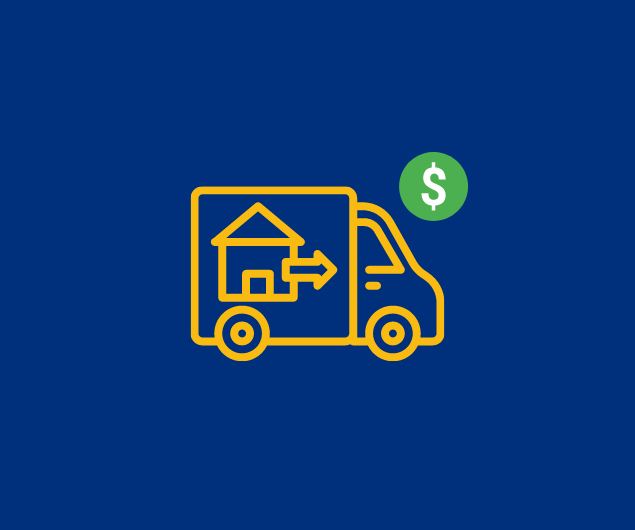Did you move this year? Or, are you planning to move this upcoming year?
During the pandemic, a large number of Canadians have moved from the cities to the suburbs, trying to find more space in and out of their homes.
As it turns out, the few thousand dollars of moving expenses can be deductible, provided that you meet certain criteria.
In some cases, you may even be able to deduct the realtor expenses you incurred to sell your old homes as a part of your moving expenses!
We talked about the HST rebate on New Home recently, and you loved it. This week we will look into deducting the moving expenses you make when moving to your new homes.
I have created a video for you as well, where I talk all about how to deduct moving expenses the right way.
According to the CRA, you can generally claim moving expenses you paid in the year from the employment or self-employment income you earned at your new work location. Provided that you meet both these requirements.
To be able to deduct moving expenses:
- You must have moved to work or to run a business at a new location,
- Your new home must be at least 40 kilometers closer (by the shortest public route) to your new work location
Let’s use an example to explain.
I moved in 2021 from Burlington to Oakville so that I could have a shorter commute to the office. The drive from my old house to the office location is 20km. The drive from my new house to the office is 11km. My new home is only 9km closer to my office. Therefore, I would not be qualified to claim any moving expenses.
Let’s use another example to explain.
You got a new job in Kitchener where you grew up. Your old job was in Toronto and you lived close by. With the new job, you decided to move back to Kitchener. It will only take you 10km to drive to your new job location. If you were to stay in Toronto, the commute each way would have been 120km.
You’re close to your work location by 110km. Therefore, you’re eligible to deduct moving expenses on your personal tax return against your income.
Now that you know the criteria to deduct moving expenses, let’s discuss the type of moving expenses that are eligible for a deduction.
What moving expenses can you deduct?
- Transportation and storage costs
This includes packing, hauling, movers, in-transit storage, and insurance for household items.
- Travel expenses
Vehicle expenses, meals, and accommodation to move you and your household members to your new home..
- Temporary living expenses for a maximum of 15 days for meals and temporary lodging near the old and the new home for you and your household members.
- Cost of cancelling your lease for your old home
Deductible expenses include the forfeiture of last month rent, any cost incurred to cancel the lease, but not your regular rental payments before your move.
- Incidental costs related to your move
For example, changing your address on legal documents, replacing driving licences and non-commercial vehicle permits (not including insurance). And also, utility hook-ups and disconnections charges are tax deductible.
- Cost to maintain your old home when vacant fter you moved, and during a period when you try to sell the home. Deductible Expenses can include interest, property taxes, insurance premiums and the cost of heating and utilities expenses. You can claim up to a maximum of $5,000.
However, you cannot claim these costs during a period when the old home was rented. This means that these costs must have been incurred when your old home was vacant.
- Cost of selling your old home can be a substantial amount of deduction.
These expenses can be related to advertising, notary or legal fees, real estate commission, and mortgage penalty when the mortgage is paid off before maturity.
Cost of buying the new home
The cost of buying your new home can also be tax deductible. This includes legal or notary fees you paid to buy your new home, as well as any taxes paid (other than GST/HST) for the transfer or registration of title to the new home.
As always, in Canadian taxpayers, we all need to earn our deduction. This means that you would be required to provide documentation and receipts for all expenses deducted.
If you don’t have receipts, you aren’t eligible for deducting the expense. Even if you have all the receipts, there are some exceptions to the deduction. Here’re a few as an example:
- Expenses for work done (e.g. renovations) to make your old home more saleable
- Any loss from the sale of your home
- Travel expenses for house-hunting trips before you move
- Travel expenses for job hunting in another city
- The value of items movers refused to take, such as plants, frozen food, ammunition, paint, and cleaning products
- Expenses to clean or repair a rented home to meet the landlord’s standards
- Expenses to replace personal-use items such as tool sheds, firewood, drapes, and carpets
- Mail-forwarding costs (such as with Canada Post)
- Costs of transformers or adaptors for household appliances
- Costs incurred in the sale of your old home if you delayed selling for investment purposes or until the real estate market improved
- Mortgage default insurance
- Eligible expenses for which you do not have the required supporting documentation
The Catch
The maximum amount you can deduct moving expenses is capped by the amount of income you are getting from your new job/new self-employment income.
You cannot use the moving expenses to deduct against investment income or other sources of income.
Don’t worry though. If your moving expenses are greater than the eligible income that you can deduct against, the extra can be carried forward for future years for deduction.
If you receive any reimbursement from your employers for the move, you will have to report the reimbursement as income, offset against the net moving expenses for the deduction.
What if your tax deductible moving expense incurred in the year after you moved?
Let’s say you moved to your new residence that’s closer to your new workplace (by 40km at least) close to the end of the year, and you have incurred a portion of the moving expenses in the year after the move.
You can then claim these expenses on your return for the year you paid them against employment income earned at the new work location.
The same rule applies if you sold your old home after the year of your move. In this situation, the CRA may ask you to submit a form with receipts and explain the delay in selling your home. But bear in mind that you cannot carry back moving expenses to a prior year.
For instance, if you have moving expenses (e.g cost of maintaining your old home when vacant) that you paid for in the current year, for a move that you made last year, you cannot claim the expenses paid in the current year on your prior year return. This is the case even if you earned employment income at the new location in the prior year. You can simply deduct the expenses in the following year.
Again, it’s not all black and white. That’s why we are here to help you navigate through it. So that you can make the most out of your tax deductible moving expenses.
Book a consultation with us at Real Estate Tax Tips today! We’re here to help you real estate investors decide if your moving expenses are tax deductible.
Until next time, happy Canadian Real Estate Investing.
Cherry Chan, CPA, CA
Your Real Estate Accountant





